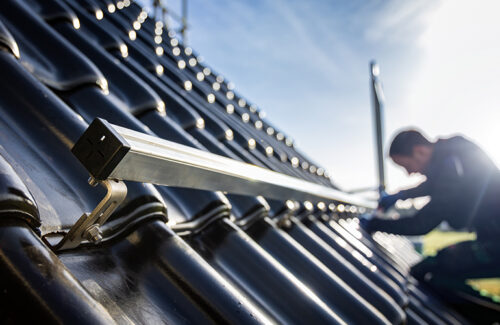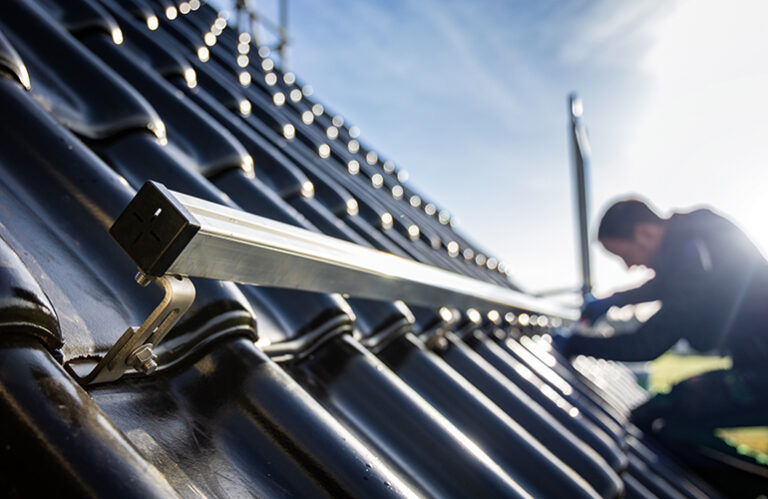Domestically manufactured solar racks and mounts may experience a boon thanks to recently imposed trade tariffs on a range of aluminum products imported from countries around the world.

Credit: Adobe Stock
The U.S. Department of Commerce imposed anti-dumping and countervailing duties (AD/CVD) on aluminum extrusions imported from 14 countries in October. After nearly thirteen months of review, these trade duties cover a list of extruded aluminum products from China, Colombia, Ecuador, India, Indonesia, Italy, Malaysia, Mexico, South Korea, Taiwan, Thailand, Turkey, the United Arab Emirates and Vietnam.
“In all this [AD/CVD] In some cases you typically see an increase in imports from the countries at stake – so the fourteen countries here – where they are taking market share from the American producers, and the prices are much lower,” says Robert. DeFrancesco, a partner in the international business practice at Wiley Rein LLP and counsel for the petitioners in this case. “They are using dumped and subsidized prices to gain market share in the United States.”
Aluminum products within the scope of these duties include rack rails for solar panels, solar tracker assemblies, battery boxes for electric vehicles, and EV charging station parts or assemblies. Aluminum frames on imported solar panels are not subject to these trade duties.
The federal government’s investigation into the current state of aluminum imports followed an existing case involving the import of aluminum extrusion from China, which was initiated in 2011. This latest AD/CVD investigation began in October 2023 after a petition was filed by the American Aluminum Extruders Coalition, a group representing 14 domestic aluminum extruders, and the United Steel Workers Union.
“To bring a case, you must have standing and demonstrate that you represent at least 25% of the American industry and 50% of everyone who voices an opinion about it,” says Greg Husisian, partner and trial attorney. attorney at Foley & Lardner LLP and chair of the firm’s International Trade and National Security Practice. “At the very beginning, there is a requirement that the application be submitted on behalf of the US industry producing the same product, and the orders generally result in quite high import duties.”
Depending on the country of origin, the new import duties on aluminum extrusions range from a few percent to almost 377%. The latter applies to imports from China. All fourteen countries received anti-dumping duties, while only China, Indonesia, Mexico and the United Arab Emirates also have countervailing duties, as a result of their own countries’ efforts to subsidize the production costs of aluminum extrusion.
AD/CVD investigations are not new to international trade or even to the solar industry, but this aluminum extrusion case had its quirks.
An unusual case of anti-dumping
The U.S. solar market is familiar with trade tariffs imposed on industry-specific products, such as the AD/CVD investigations on solar cells imported from Southeast Asia. However, solar cells generally have similar production methods and fall within one product group. AD/CVD studies typically focus on a single product type.
‘Aluminum extrusion’ is instead a production method that covers a wide range of different industries, from door frames to solar shelving, and even includes ‘manufacturing’.
“[This] is a very strange sequence, a very complicated scope, because it is based on the way the product is made and not the physical product,” Husisian said. “That’s why it encompasses so many different things… because it’s based on a manufacturing process that reflects the fact that you can press the aluminum into almost any shape you want.”
According to the final investigation files, the trade considers aluminum extrusions from those countries subject to these duties “regardless of form, finish or manufacture, whether or not assembled with other parts, coated, painted, anodized or thermally improved.” If the product is extruded using the common elements that make up aluminum and comes from one of these 14 countries, it will be subject to additional trade duties.
The exception to these duties applies to aluminum extrusions that are permanently assembled with components other than other aluminum extrusions and fasteners. That is why aluminum frames on solar panels are not subject to the levies.
How these duties can influence the market
The purpose of initiating an AD/CVD investigation is to create a level playing field within a given market, DeFrancesco said. Now that these duties are in place, importers will be responsible for paying the additional costs for tainted extruded aluminum reaching U.S. ports. The party making the purchase is usually the one paying these duties.
“You’re going to see a lot of renegotiations, a lot of risk management strategies,” Husisian said. “Sometimes people come up with arrangements that are not there [setting] the final price until the administrative review is completed.”
One year after the AD/CVD charges come into effect, the Commerce Department will reassess its decisions to see if the initially set interest rate for cash deposits was sufficient. There is a chance that these duties could change, which would result in importers being charged or refunded.
Additionally, with these tariffs in place, there is a chance that the supply and prices of aluminum extrusion in the United States will fluctuate, Husisian said. But the original purpose of starting this investigation was to bring business to domestic aluminum extruders, including solar racking, mounting and tracker suppliers.
“Like all these cases, it’s always a lot of work at the beginning, and at the very end it’s an awful lot of work,” DeFrancesco said. “We have high hopes for a good result, and we will have to wait and see.”


